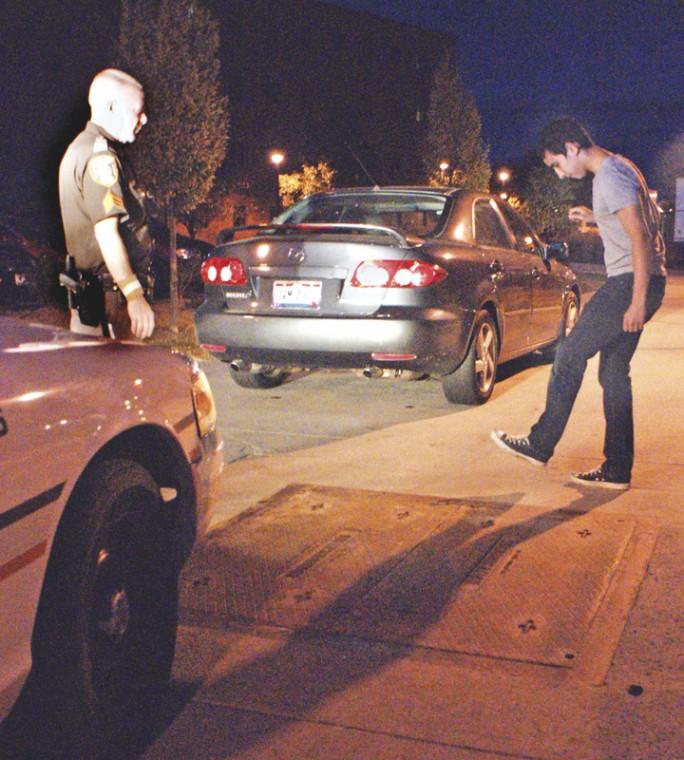To decrease the number of drunk drivers on the road, law enforcement agencies nationwide have created harsher punishments for operating a vehicle impaired.
Senior Abigail Northrup said drunk driving has affected her negatively after her roommate was charged with an OVI this summer.
“Around 5 a.m. after a long night of drinking, my roommate decided she wanted to visit her boyfriend who lives in the next town over. She was pulled over as she was merging onto North I-75 and was arrested after blowing over three times the legal limit,” Northrup said.
Northrup said once her roommate returned home in the morning, her parents came to pick her up and take her home for good.
“My roommate told her parents she drove drunk because she was picking up a friend from a party,” she said. “She knew what she did was stupid which is why I think she is having difficulty owning up to her mistake, and that has put a huge strain on our relationship.”
Attorney for Student Legal Services Mike Skulina said penalties for drunk driving have not necessarily become stricter, but new technology and fines have been added within the last five years.
“The ignition interlock device requires a driver to give a breath sample prior to starting their car. If the Breathalyzer detects any alcohol content the car simply will not start,” he said. “And the fines for the OVI have gone up $75.”
Administrative Lieutenant for the Bowling Green Police Department Bradley Biller said there are a variety of things that can happen when someone is suspected of an OVI.
“First, there has to be reasonable grounds for an officer to pull over someone, usually a routine traffic stop such as lights aren’t on, speeding, rolling through a stop sign,” Biller said. “At that point if the officer suspects the driver to be under the influence, then he or she can ask the driver to complete a series of field sobriety tests like walking a straight line or reciting the alphabet. If the individual fails these tests, the officer can take the driver into custody where more tests will be given at either the police station or a medical center.”
The tests include drawing blood, a urine test, and a Breathalyzer. If any of these tests indicate a 0.08 percent blood alcohol content or higher, the individual is immediately placed under arrest, Biller said.
“If the driver refuses to have any of these tests done they automatically give up their right to drive, which is a law imposed by the state and through the officer that was on the scene,” he said.
City code is regulated by the state of Ohio’s OVI ordinance, and the city code states the driver can be picked up from the station by a responsible driver, after they meet in front of a judge and wait for bond. If no one is able to pick the driver up, then they will be released to the Wood County Justice System, Biller said.
“As for recommendations on whether the University takes action on giving the student any kind of punishment, it is entirely up to the student affairs office,” he said.
The mandatory minimum penalties include three days to six months in jail, fines between $375-$1075, a $90 court fee, $35 probation fee, driver improvement program and loss of driver privileges for 15 days, with exceptions for work or school if the driver does not live within walking distance, Skulina said.
Northrup said her and her roommates have all had to take jobs in order to pay the extra $90 a month each in rent now that her roommate has had to drop out of school and move home.
“She has not paid her rent for the time she spent living in our house over the summer because that money now has to go towards paying upwards of $2,000 in court fees,” she said. “Our rent is about $360 a month for each of us. The money she would’ve paid in rent for the year just about amounts to the cost of her court fees. We’re literally paying for her mistake.”
Skulina said several steps are taken after a student is charged with a OVI.
“First there is a pre-trial two to four weeks after the initial traffic stop to review evidence the prosecutor has against the driver,” Skulina said. “This includes video from the police car, audio and other records.”
After that, there is a motion hearing and a trial if the individual decides to contest. This means they are challenging the validity of the evidence the prosecutor has against them, for example, the accuracy of the Breathalyzer machine, Skulina said.
Skulina said drunk driving is an issue in the city because of the location of the bars and residential areas. The larger student apartment complexes are farther away from campus than the residence halls.
“Right now it is not as big of an issue because it is still relatively warm out, but in the winter students find themselves questioning getting into their cars after drinking because it is so cold,” he said. “If I could give the students any advice it would be that it is definitely not worth the risk to drive drunk or buzzed. We’re hopeful to see what the result the shuttle bus has in town and that numbers of DUIs/OVIs go down.”
Northrup said she realizes now how many lives one person can affect by not thinking before they get into a car and drive while they are intoxicated.
“It’s disappointing that I have lost all connection with someone I used to consider myself close with because of this,” she said. “It didn’t have to turn out this way, and it’s unfortunate that it did. She decided to make a completely selfish decision and look where she ended up; out of college and back home with her parents.”














